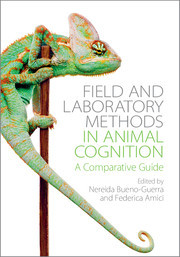Foreword Josep Call; Introduction: the concept of umwelt in experimental animal cognition Nereida Bueno-Guerra and Federica Amici; 1. Ants – individual and social cognition Zhanna Reznikova; 2. Bats – using sound to reveal cognition Yossi Yovel and Stefan Greif; 3. Bees – the experimental umwelt of honeybees Randolf Menzel; 4. Carib grackles – field and lab work on a tame, opportunistic island icterid Simon Ducatez, Sarah E. Overington, Jean-Nicolas Audet, Marine Battesti and Louis Lefebvre; 5. Chicken – cognition in the poultry yard Cinzia Chiandetti and Giorgio Vallortigara; 6. Chimpanzees – investigating cognition in the wild Roman M. Wittig and Catherine Crockford; 7. Dolphins and whales – taking cognitive research out of the tanks and into the wild Volker B. Deecke; 8. Elephants – studying cognition in the African Savannah Lucy A. Bates; 9. Fish – how to ask them the right questions Catarina Vila Pouca and Culum Brown; 10. Hermit crabs – information gathering by the hermit crab, pagurus bernhardus Robert W. Elwood; 11. Hyenas – testing cognition in the umwelt of the spotted hyena Lily Johnson-Ulrich, Kenna D. S. Lehman, Julie W. Turner and Kay E. Holekamp; 12. Lizards – measuring cognition in lizards: practical challenges and the influence of ecology and social behaviour Martin J. Whiting and Daniel W. A. Noble; 13. Meerkats – identifying cognitive mechanisms underlying meerkat coordination and communication: experimental designs in their natural habitat Marta Manser; 14. Octopuses – mind in the waters Jennifer A. Mather and Michael J. Kuba; 15. Grey parrots (Psittacus erithacus) – cognitive and communicative abilities Irene M. Pepperberg; 16. Sharks – elasmobranch cognition Tristan L. Guttridge, Kara E. Yopak and Vera Schluessel; 17. Spiders – hints for testing cognition and learning in jumping spiders Elizabeth M. Jakob, Skye M. Long and Margaret Bruce; 18. Tortoises – cold-blooded cognition: how to get a tortoise out of its shell Anna Wilkinson and Ewen Glass; Epilogue Nereida Bueno-Guerra.

